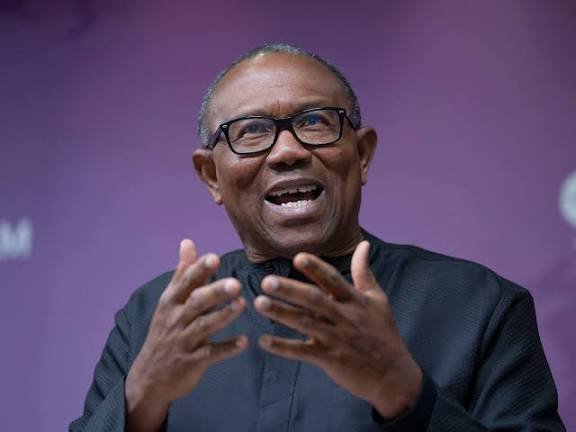Former Governor of Anambra State and 2023 Labour Party presidential candidate, Mr. Peter Obi, has said that the ingenuity and digital skills often exhibited by Nigerian internet fraudsters — popularly known as “Yahoo Boys” — can be redirected towards productive ventures capable of driving national development if the government provides the right guidance, mentorship, and opportunities.
Obi made the remark while speaking at a youth empowerment summit in Lagos on Saturday, where he emphasized the need for Nigeria to rethink its approach to tackling cybercrime. According to him, the country’s young people possess enormous creative and technological potential that could be harnessed to transform the nation’s economy if properly channeled.
Redirecting Talent, Not Condemning It
Speaking to a large audience of students, tech innovators, and entrepreneurs, Obi said Nigeria must begin to see its youths as “assets, not liabilities.” He stressed that the so-called “Yahoo Boys” — while operating illegally — demonstrate high levels of intelligence, innovation, and digital literacy that, if redirected, could benefit the nation’s technology and startup ecosystem.
“I have always said that Nigerian youths are among the most creative in the world,” Obi said. “The problem is not their lack of intelligence; it is the lack of opportunities. If the same energy, time, and intelligence that many young people put into internet fraud are redirected into legitimate tech ventures, software development, cybersecurity, and digital innovation, Nigeria will be exporting technology instead of losing its reputation to cybercrime.”
He further noted that the failure of successive governments to create an enabling environment for youth development has pushed many bright minds into illegal activities. “A society that does not give its young people hope will end up breeding frustration and crime,” he added.
The “Yahoo Boys” Phenomenon
In Nigeria, “Yahoo Boys” is a colloquial term used to describe individuals who engage in online fraud, often involving financial scams, identity theft, or impersonation. Over the past decade, cybercrime has become a major concern for Nigerian authorities and international partners, with the country ranking among the top global sources of online scams.
However, beneath the criminal element lies a complex social and economic story. Many experts have pointed out that some of those involved in cybercrime possess advanced coding, hacking, and data manipulation skills, learned through self-education and online exposure.
Cybersecurity expert, Dr. Tunde Ajibade, explained that “many of these young men and women understand the digital ecosystem better than some professionals. They can manipulate systems, write scripts, and build phishing infrastructure. These are valuable technical abilities — the problem is that they are using them in the wrong direction.”
This is precisely the kind of redirection Obi believes Nigeria urgently needs to implement.
Obi’s Vision: Turning Digital Crime into Digital Innovation
Peter Obi, who has consistently advocated for investment in human capital and technology-driven governance, outlined a framework for reorienting Nigeria’s digitally savvy youths. He suggested a multi-pronged approach that includes education reform, mentorship programs, startup incubation, and government-private sector collaboration.
“We need to move from punishing our young people to empowering them,” Obi said. “Yes, cybercrime must be condemned and punished by law. But at the same time, we must identify the underlying creativity in these youths and channel it toward productive goals. It’s about transformation, not just condemnation.”
He proposed that government agencies such as the National Information Technology Development Agency (NITDA) and the Ministry of Communication, Innovation and Digital Economy should develop targeted re-skilling initiatives to convert tech-savvy youths into ethical digital entrepreneurs.
“We should be creating innovation hubs in every state — places where these young minds can be trained, mentored, and funded to build startups instead of scams,” he said.
Youth Empowerment Through Technology
Obi’s remarks resonate strongly with his broader political and economic philosophy, which emphasizes production over consumption and investment in youth empowerment as a national growth strategy.
He argued that Nigeria’s path to development must include a strong focus on digital economy expansion. “We are in a technology-driven age. The future of every economy is digital — artificial intelligence, blockchain, cybersecurity, data science. Nigerian youths can dominate these spaces if they are properly guided,” Obi said.
Nigeria’s digital economy currently contributes around 18% to the country’s GDP, according to data from the National Bureau of Statistics (NBS). Analysts believe that with targeted investment and training, this figure could easily double within a decade.
Obi suggested that part of the government’s anti-corruption and crime prevention strategy should include redirecting the energy of at-risk youths toward innovation. “You don’t solve the problem of crime only by policing it — you solve it by preventing it through opportunity,” he emphasized.
Public Reactions and Expert Opinions
Obi’s comments have generated a wide range of reactions across the country. While some applauded his pragmatic approach, others cautioned against glorifying internet crime or appearing to rationalize it.
Human rights activist Aisha Yesufu described Obi’s perspective as “forward-thinking and practical.” According to her, “you cannot fight youth crime in a vacuum. You must address the root causes — unemployment, lack of digital infrastructure, and exclusion. Obi is right to suggest that we harness these energies positively.”
On the other hand, some conservative voices within the security establishment warned that reorienting “Yahoo Boys” could be misinterpreted as leniency. A senior officer with the Economic and Financial Crimes Commission (EFCC), speaking anonymously, said: “We support rehabilitation and training, but there must first be accountability. People must face justice before they can be reformed.”
Cyber policy analyst and lecturer, Dr. Funmi Alade, offered a balanced view. “Peter Obi’s statement is not an endorsement of cybercrime. It’s a call for innovation in how we see our youth. The same young Nigerians who build scams can also build cybersecurity solutions and fintech startups. We just need the structure to make that happen.”
Lessons from Other Countries
Globally, several nations have implemented successful programs to redirect the energies of tech-savvy youths away from illegal hacking and toward innovation. For instance, countries like Estonia and Israel have turned their young digital enthusiasts into cybersecurity experts, forming the backbone of national defense and private-sector innovation.
In the United States, several ethical hacking programs and reformation initiatives offer offenders the chance to work in tech after rehabilitation. “The lesson for Nigeria,” Obi said, “is that punishment should not be the end — transformation should be the goal.”
He emphasized that creating legitimate digital opportunities can reduce crime rates, stimulate innovation, and enhance Nigeria’s global image. “When people see that there are real jobs in the tech industry, they will stop risking their lives and reputations in fraud. Give them a chance to build, and they will build something great,” he concluded.
Government Responsibility and the Way Forward
Obi called on the federal and state governments to invest more heavily in digital education, coding programs, and startup funding for young innovators. He also urged private companies to partner with government agencies to build technology parks and digital training centers across the country.
He said: “We cannot continue exporting our best brains to other countries because of lack of opportunity. Let’s turn Nigeria into a hub for technology, not cybercrime.”
The former governor also highlighted the need for value reorientation in the education system, stressing that schools must teach ethics, digital literacy, and entrepreneurship from early stages.
“Nigerian youths are not lazy — they are victims of a broken system. Once we fix education and give them hope, we will unleash the full potential of our country,” Obi stated.
Conclusion
Peter Obi’s statement that “Yahoo Boys’ creativity can drive national development if properly guided” reflects a deep understanding of Nigeria’s youth crisis and the need for a strategic, rehabilitative approach to digital empowerment. His remarks challenge the country to look beyond condemnation and invest in transformation — turning criminal potential into creative capital.
As Nigeria continues its struggle with unemployment, cybercrime, and underutilized talent, Obi’s call serves as a reminder that within the nation’s challenges lie the seeds of innovation. With the right policies, mentorship, and vision, the same digital ingenuity once used for fraud could become a powerful engine for national development and global competitiveness.














